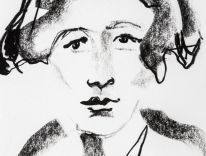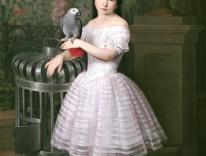In honor of National Poetry Month, I'm going to be offering weekly recommendations of contemporary poets worth reading. Today, I'll start things off with Nate Klug, a young poet whose new collection, Anyone, has just been published by the University of Chicago Press.
In his Adagia, Wallace Stevens writes that "the poet feels abundantly the poetry of everything." To the poetic imagination, the world isn't described through poetry; it is poetry, at least when the world is seen most clearly and truthfully. Klug's work offers exactly this kind of reorienting of perspective, showing us the world in all of its particularity and with all of its resonances.
Klug, who has a Masters from Yale Divinity School and is a Congregationalist minister, has spoken about the role of writing in a life of faith, and his poems continually examine the relation between vision and writing, sensory perception and divine revelation. Take, for example, his poem entitled "Milton's God." (This and all subsequent poems can be found on the Poetry Foundation's website):
Where i-95 meets the Pike,
a ponderous thunderhead flowered;stewed a minute, then flipped
like a flash card, tattered
edges crinkling in, linings so dark
with excessive brightthat, standing, waiting, at the overpass edge,
the onlooker couldn’t decideuntil the end, or even then,
what was revealed and what had been hidden.
The italicized lines come from Book III of Milton's Paradise Lost, where we hear that God "Amidst the glorious brightness where thou sit'st [is] / Thron'd inaccessible, but when thou shad'st / The full blaze of thy beams, and through a cloud / Drawn round about thee like a radiant Shrine, / Dark with excessive bright thy skirts apeer."
Like Milton, Klug sees the world and its author as both terrifying and beautiful--in fact, terrifying in its beauty and beautiful in its terror. The poem shifts between figures in the hopes of capturing the thunderhead's sublimity, first describing it with natural imagery ("flowered"), then with the language of human emotion ("stewed"), then with a striking simile ("flipped / like a flash card"), before borrowing from Milton, all in the hopes of deciphering and then rendering what this natural image has revealed.
Klug's first book, Rude Woods, was an adapatation of Virgil's Eclogues, and his poems pay wonderful attention to the natural world. Here is "Dare," a short lyric that describes a vision of a goshawk admist the dirtiness of New Haven:
Not, this time, to infer
but to wait you out
between regret and parking lot
somewhere in the day
like a dareSalt grime and the foodcarts’
rising steam, at Prospect St. a goshawk
huge and aloof, picking at something,
nested in twigs and police tape
for a while we all
held our phones upIt is relentless, the suddenness
of every other
song, creature, neighbor
as though this life
would prove you
only by turning into itself
Finally, here is "Conjugation," an appropriate poem for a cold, early spring day and a reminder of the world's ridiculous, enchanting particularity:
This early the garden’s bare
but people pay to walk it,at plots of budless brush
stop, as if remembering,and stoop to mouth the names—
araucariaaraucana, monkey
puzzle tree, somethingJapanese—each particular
ridiculous to be.

